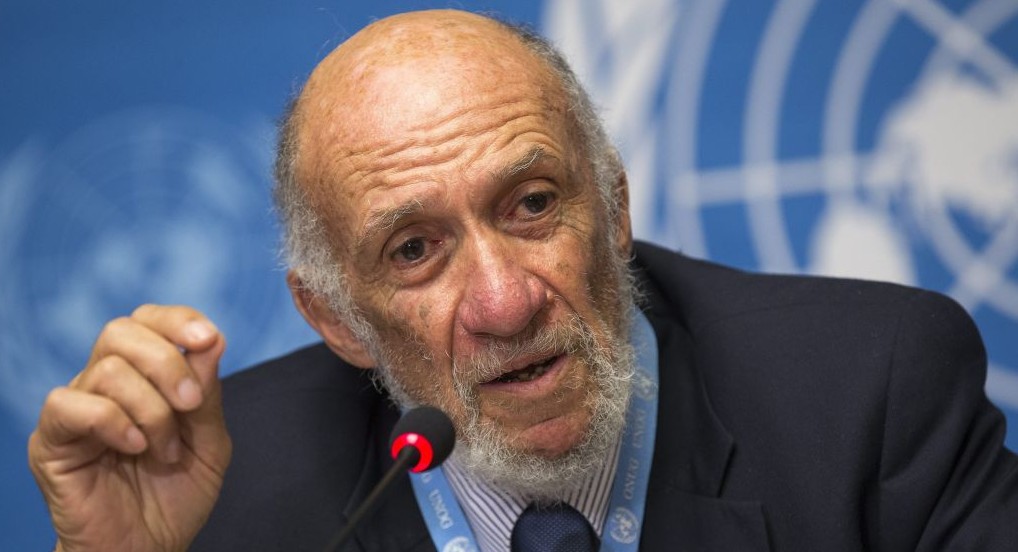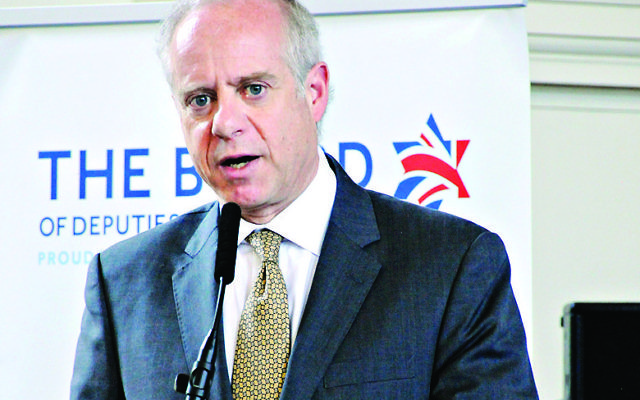Jewish students told ‘don’t study at LSE’ by Board president
Community leader Jonathan Arkush 'strongly advised' students not to attend university at LSE because of the hostile atmosphere
The president of the Board of Deputies has told Jewish students not to study at the London School of Economics because the prestigious university hosted an American professor who has been repeatedly condemned for anti-Semitism.
In an unusual move, Jonathan Arkush “strongly advised” Jewish students where not to study, after LSE chiefs stood by their decision to invite Professor Richard Falk, former United Nations Special Rapporteur to Palestine.
Falk’s recent co-authored report for a UN commission accuses Israel of “apartheid,” and in his former UN role he accused the state of “war crimes”. He was speaking in London on Monday at the launch of his book Palestine’s Horizon: Towards a Just Peace, in which he says Jerusalem has been “ethnically cleansed”.
Reacting to LSE’s decision, Jonathan Arkush tweeted: “As @LSEnews thinks it ok to have people like Richard Falk to speak, I strongly advise Jewish students to study elsewhere.”
https://twitter.com/BoDPres/status/844329326673842177
The LSE’s Jewish Society said it was “completely unacceptable that Jewish students were subjected to the comments made during the talk”, and called for the university to take “strong action” after the event turned ugly.
Gilad Atzmon, one of Falk’s supporters in the audience, told students to read the works of notorious Holocaust denier David Irving.
In 2012, the UK’s Foreign & Commonwealth Office condemned Falk for providing the cover endorsement for Atzmon’s book The Wandering Who, which accuses “the Jews” of being “the only people who managed to maintain and sustain a racially-orientated, expansionist and genocidal national identity that is not at all different from Nazi ethnic ideology”.
Falk’s address was interrupted as the event descended into chaos, with pro-Israel and pro-Palestinian activists shouting accusations. Two pro-Israel activists – Jonathan Hoffman and Sharon Klaff – were removed for disruption.
At the back of the room, security guards waded into a fracas, with postgraduate Sapan Maini-Thompson later saying Atzmon audibly claimed Jews were being removed for misbehaviour, as in Germany.
He told Jewish News: “He said to those around him ‘the Jews were expelled from Germany for misbehaving’ – which he repeated when challenged.
“He was recommending to those around him to read the works of David Irving and said Israel’s actions in the occupied territories are Hitlerian. After the event, I went up to the man and aggressively called him a Nazi. I’m not hiding that.”

While stressing he was not accusing anyone on the panel of anti-Semitism, he said of those in the audience who had made the remarks: “LSE should be far stricter on vetting procedures for those coming on to campus. Known fascists shouldn’t be allowed on campus.”
Atzmon later confirmed to Jewish News he “indeed” recommended Irving’s work “to anyone who is interested in history rather than the Holocaust religion”. He added that Jews have been expelled from many countries, saying: “Jews are always expelled for a reason. This isn’t to say I support expulsion or any measure against Jews or anyone else.”
During the launch – organised by the Civil Society and Human Security Unit within LSE’s Department of International Relations and also promoted by the Council for Arab-British Understanding –Hoffman repeatedly shouted at Falk, calling him an “anti-Semite”. He unfurled an Israeli flag as he was led out.
In a statement, the LSE’s Jewish Society said it was “appalled by the treatment of Jewish students”, adding: “Prior to the event, we raised concerns through official channels. No substantial response was received. During the event, physical threats were also made to Jewish students by another attendee who was not removed from the event by security.”
Additionally, a joint statement was issued from the Students Union and LSESU Jewish Society, which said: “The SU is disappointed and dismayed to see that the School failed to seriously acknowledge and respond to the concerns raised by Jewish students regarding the invitation of Richard Falk on campus on the 20th March 2017. Despite the heads of the School, as well as the department, being contacted about these concerns in advance of the event, the issues were not replied to.
We are therefore shocked and upset to hear of the subsequent anti-Semitic incidents that occurred during the event, and acknowledge that many Jewish students must currently feel negatively impacted”.
Attention had initially focused on a report Falk recently co-authored on behalf of the UN’s Economic and Social Commission for Western Asia (ESCWA), which concluded that Israel was imposing an “apartheid regime” on the Palestinians. After protests from the US, it was withdrawn from the ESCWA website.
Falk, who is professor emeritus of international law at Princeton University, said the “firestorm” the study provoked meant it gained “ten times more attention than it otherwise would have,” after Israel’s Foreign Ministry likened it to Der Sturmer, an anti-Semitic Nazi propaganda publication.
“US Ambassador Nicki Haley attacked the report by attacking me,” said Falk. “It’s illustrative of a problematic situation, which has arisen over the last five or six years, that Israel and its strongest supporters no longer want to argue on the substance of the issues relating to their administration of the Palestinian people. They attack the messenger.”
During the event, Falk referred to the “changing dynamics of Zionist ambition”.
UN Watch had earlier called for him to be expelled from the UK because of his past remarks, but the LSE defended hosting him. It said: “We are committed to encouraging the free exchange of ideas in an atmosphere of respect, even on issues over which views differ sharply, such as the Middle East.”
Before the end of the event, chair Prof May Kaldor said to loud applause: “I am deeply ashamed on behalf of the LSE that there should be people who come to a meeting of this kind and behave in this way. It illustrates to me how unacceptable the way free speech is being closed down in
this country.”

Thank you for helping to make Jewish News the leading source of news and opinion for the UK Jewish community. Today we're asking for your invaluable help to continue putting our community first in everything we do.
For as little as £5 a month you can help sustain the vital work we do in celebrating and standing up for Jewish life in Britain.
Jewish News holds our community together and keeps us connected. Like a synagogue, it’s where people turn to feel part of something bigger. It also proudly shows the rest of Britain the vibrancy and rich culture of modern Jewish life.
You can make a quick and easy one-off or monthly contribution of £5, £10, £20 or any other sum you’re comfortable with.
100% of your donation will help us continue celebrating our community, in all its dynamic diversity...
Engaging
Being a community platform means so much more than producing a newspaper and website. One of our proudest roles is media partnering with our invaluable charities to amplify the outstanding work they do to help us all.
Celebrating
There’s no shortage of oys in the world but Jewish News takes every opportunity to celebrate the joys too, through projects like Night of Heroes, 40 Under 40 and other compelling countdowns that make the community kvell with pride.
Pioneering
In the first collaboration between media outlets from different faiths, Jewish News worked with British Muslim TV and Church Times to produce a list of young activists leading the way on interfaith understanding.
Campaigning
Royal Mail issued a stamp honouring Holocaust hero Sir Nicholas Winton after a Jewish News campaign attracted more than 100,000 backers. Jewish Newsalso produces special editions of the paper highlighting pressing issues including mental health and Holocaust remembrance.
Easy access
In an age when news is readily accessible, Jewish News provides high-quality content free online and offline, removing any financial barriers to connecting people.
Voice of our community to wider society
The Jewish News team regularly appears on TV, radio and on the pages of the national press to comment on stories about the Jewish community. Easy access to the paper on the streets of London also means Jewish News provides an invaluable window into the community for the country at large.
We hope you agree all this is worth preserving.
- Jonathan Arkush
- LSE
- Palestine’s Horizon: Towards a Just Peace
- Richard Falk
- United Nations Special Rapporteur to Palestine
- London School of Economics
- UK’s Foreign & Commonwealth Office
- Jonathan Hoffman
- Sharon Klaff
- Sapan Maini-Thompson
- david irving
- Gilad Atzmon
- News
- palestinians
- Board of Deputies of British Jews






















